book2 unit4 reading 2学案
text2 unit4 book2预习学案

Step1 reading comprehension1.What's the main idea of the passage?A.The beautiful scenery of the Ireland.B.The history of the Ireland.C.The beautiful scenery and its traditions.D.The customs of the Ireland.2.Why has Ireland produced many great writers and poets?A.The people there are all good at writing.B.The beautiful countryside gives them inspiration.C.The modern industry makes them free from labor(劳动).D.The education system there is advanced.3.What makes the Irish countryside exciting and inspiring?A.The beautiful countryside scenery of the Ireland.B.The long history of the Irish countryside.C.The traditions of the Irish countryside.D.Many green countries in the Ireland4.Ireland has developed its strong traditions that includeA.songsB.dancingC.foodD.All the above5.What are the best ways to experience some Irish traditions and cultures?A.Dance with the natives.B.Drink a glass of wine or a local beer in a village pub.C.Sing a song with the natives.D.Enjoy some traditional musicStep 2 true or false1.Ireland has produced a lot of great writers and poets.( )2.All your senses can be satisfied by the beautiful countryside landscape in Ireland.( )3.You can visit a local museum and experience the rich Irish culture and traditions.( )4.It is the modern country life that makes Ireland develop its own traditions.( )5.Ireland is also famous for its delicious traditional Beef Stew.( )Step3语篇填空People in Ireland and Ireland’s traditions are1. (great) influenced by its beautiful countryside.During its long history,many great 2. (poem) andwriters appeared.The 3.(peace) landscape of the “Emerald Isle” and its many green counties is a true feast for the eyes,with its rolling green hills 4.(dot) with sheep and cattle.The roar of the ocean waves and cries of the seabirds make 5.the music of the coast.On a quiet morning in the mountains,you can feel the sun shining on your skin,and take a 6.(breathe) of the sweet scent of fresh flowers with birds 7. (greet)the new day with their morning song.With all this beauty,it is not 8.(surprise) that Ireland has developed strong traditions that include music,dancing,and dining.Step4 writing•Use what you have learnt in this unit to describe an interesting, exciting, or surprising place.• 1. Choose one of your favourite places and tell why you think it is interesting, exciting, or surprising.• e the questions below to describe the place you have chosen.•1)What can you see?•2) What can you hear?•3) How does the place feel?•4) What can you smell?•5) what can you taste there?•6) What does the place make you think or feel?•sample•In my village,every day starts with a “fire”! The houses turn red as the sun rises above the mountains.•Seeing the flames, the roosters(公鸡) sound the alarm. They wake everyone in the village with their loud cries, chasing(追赶) the children to school and rushing the adults to work. In the evening, a gold haze(薄雾) settles over everything. This is my favourite time of the day, when all work for the day has been completed. When the smell of hot oil and fragrant spices(香料) float through the air, I know that it will soon be time for dinner. My neighbours begin to call their children to come home.The birds begin their nightly quarrel over their favourite places to rest.•At night, the stars come out to tell us that all is well and my village grows quiet.For now we’ll sleep. And tomorrow the sun wi ll set us on fire again for a new day.作业1.背单词2.背经典句子3.完成一篇语法填空。
B2U4_Reading_2

Appreciation
Examples
1. What are examples used for?
Examples are used to support your argument or help explain an idea that may be difficult for the reader to understand.
A __s_e_n_s_it_iv_e__ human soul can bring hidden truth and beauty to our attention, just as the shell __re_f_l_ec_t_s___ the unnoticed sounds. Besides, good literature can __a_w_a_k_e_n___ our feelings and arouse our imagination. Furthermore, literary classics should contain two __el_e_m__en__ts__: __u_n_i_v_er_s_a_l_ interest and personal style.
Good literature reflects the most basic human nature—love and hate, joy and sadness, fear and hope. love—hate, joy—sadness
Appreciation
3. Find more pairs of antonyms in the article and think of more on your own. What amazed the child was not a new world, but the unnoticed music of the old. new—old
2020版牛津译林 BOOK2 UNIT 4 重点知识解析(学案)
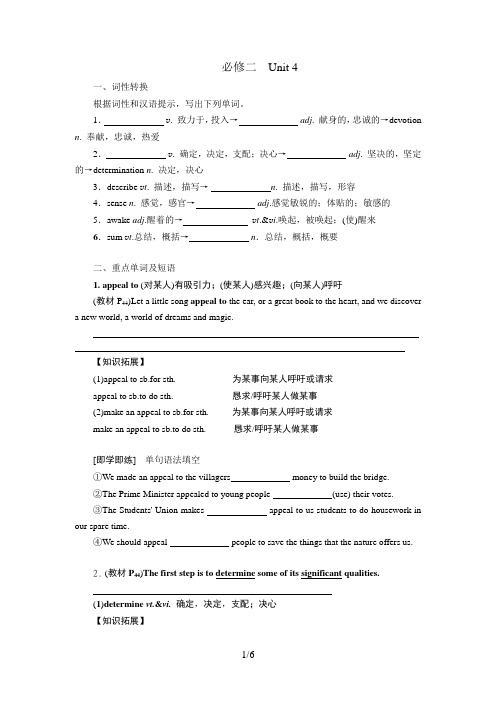
必修二Unit 4一、词性转换根据词性和汉语提示,写出下列单词。
1._____________ v. 致力于,投入→_____________ adj. 献身的,忠诚的→devotion n. 奉献,忠诚,热爱2._____________ v. 确定,决定,支配;决心→_____________ adj. 坚决的,坚定的→determination n. 决定,决心3.describe v t. 描述,描写→ _____________n. 描述,描写,形容4.sense n. 感觉,感官→_____________ adj.感觉敏锐的;体贴的;敏感的5.awake adj.醒着的→_____________ v t.&v i.唤起,被唤起;(使)醒来6.sum v t.总结,概括→_____________ n.总结,概括,概要二、重点单词及短语1. appeal to (对某人)有吸引力;(使某人)感兴趣;(向某人)呼吁(教材P44)Let a little song appeal to the ear, or a great book to the heart, and we discover a new world, a world of dreams and magic._______________________________________________________________________ ________________________________________________________________________ 【知识拓展】(1)appeal to sb.for sth. 为某事向某人呼吁或请求appeal to sb.to do sth. 恳求/呼吁某人做某事(2)make an appeal to sb.for sth. 为某事向某人呼吁或请求make an appeal to sb.to do sth. 恳求/呼吁某人做某事[即学即练]单句语法填空①We made an appeal to the villagers_____________ money to build the bridge.②The Prime Minister appealed to young people _____________(use) their votes.③The Students' Union makes _____________ appeal to us students to do housework in our spare time.④We should appeal _____________ people to save the things that the nature offers us.2.(教材P44)The first step is to determine some of its significant qualities.____________________________________________________(1)determine vt.&vi.确定,决定,支配;决心【知识拓展】(1)determine to do sth. _____________(表示动作)(2)determined adj. 坚决的,坚定的be determined to do sth. _____________(表示状态)(3)determination n. 决心with determination 坚决地,果断地[即学即练]单句语法填空①From his_____________ (determine) look, we can know his confidence.②There were many diving spots in the area and Larry was determined_____________ (visit) all of them.③He determined _____________(go) home after work at once.④The work needs long patience and _____________(determine).(2)significant adj.有重要意义的,显著的【知识拓展】(1)It is significant that ... 很明显……(2)significance n. 意义,意思,重要性be of significance to... _____________attach significance to... _____________(to为介词)[即学即练]单句语法填空①In my view, practicing handwriting is _____great significance to the students' growth.②As time goes by, I attach more great significance to _____________ (do) what I am doing now.③The new drug has great _____________(significant) for the treatment of the disease.④I think it was significant _____________he never knew his own father.3.(教材P45)Some truth and beauty remain unnoticed until a sensitive human soul brings them to our attention, just as the shell reflects the unnoticed sounds._______________________________________________________________________ ________________________________________________________________________ reflect vi.思考vt.映射;反射;反映;思考【知识拓展】(1)reflect ...in ... 在……中映出……be reflected in 倒映在;反映在reflect on/upon sth. 反省/认真思考某事(2)reflection n. 反射;反照;反映;映像;沉思on reflection 再三考虑[即学即练]单句语法填空1)English writing is the reflection (reflect) of students' English level.2)She could see her face reflected(reflect) in the car's windshield.3)At first I thought it was a bad idea, but on reflection I realized she was right.4)Reflecting(reflect) on her volunteer experience, Tina felt proud of what she had achieved.5)Our newspaper aims to reflect the views of the local community.(f翻译)———————————————————————————————————4.capable adj.有能力的,有才能的,能力强的(教材P45)One who reads it is capable of seeing the beauty that was hidden from his eyes before.___________________________________________________________________【知识拓展】(1)be capable of...—————————(2)capability n. 才能,能力;容量[即学即练]单句语法填空①Age affects the range of a person's ____________ (capable).②He's quite capable of ____________ (lie) to get out of trouble.③I'm ____________ (perfect) capable of doing it myself, thank you.④They have____________ capability to destroy the enemy in days rather than weeks.5.contain vt.包含;容纳;容忍;克制(强烈的感情等)(教材P45)To achieve this, it should contain two elements: universal interest and personal style. ____________________________________________________________ 【知识拓展】contain oneself克制自己;自制container n. 容器[即学即练]单句语法填空①The little girl could hardly contain _____________(her) for joy when she opened the parcel.②Be careful of information _____________(contain) in advertisements.③The book _____________ (contain) a lot of pictures taken during my childhood.④She bought a bag large enough ___________contain the books.[辨析]contain, includecontain 通常用来指某容器中盛有某物、装有某物;还可指某种物质中含有某种成分或含有其他物质,指作为组成部分而被包含或容纳在内include 通常表示把某事物作为其中的一部分包含在内,在句中常构成分词短语sth.included 或including sth.三、重点句式1.be doing ...when ...句式(教材P44)A child and a man were walking on the beach when the child found a shell and held it to his ear.____________________________________________________________[句式分析]be doing ...when ...“____________________________________”,when 为并列连词,表示“这时;突然”,相当于and at this/that time。
鲁教版五四学制小学英语三年级下册第一单元BOOK2UNIT4备课教案

鲁教版五四学制⼩学英语三年级下册第⼀单元BOOK2UNIT4备课教案Unit 4 Home⼀、单元⽬标:1、能正确认读和书写字母U~Z。
2、能听懂、会说、认读单词:home, beautiful, on, read, in, where, kitchen,under, bed, behind, door, 并能结合句型灵活运⽤。
3、能听懂、会说、认读句型:“We have a big living room”. “I read in mybedroom.” “Where’s Danny?”“He’s behind the door.”4、能运⽤所学内容介绍家中的各个房间,询问及回答⼈或物所处的位置。
5、简单了解⼀些中外住宅的布局特点,同时培养对家的感情。
⼆、作业设置:1、听录⾳,模仿跟读。
2、邀请你的朋友到家做客,并向你的朋友介绍⼀下⾃⼰的家。
三、教案设计:教案设计(⼀)Lesson 1 We have a big living room⼀、教学内容Book3 Unit4 My Home Lesson1 We have a big living room⼆、教材分析:本课主要是通过展⽰家庭居室结构,让学⽣学习家、客厅、卧室、餐厅的英⽂名称。
家是每个学⽣最熟悉的地⽅,学⽣要学会运⽤本课所学知识来简单描述⾃⼰的家,结合学过的语⾔描述各个房间。
教学⽬标:通过学习单词及句型,能简单描述⾃⼰的房间,能够正确认读并书写字母:Uu, Vv, Ww.三、教学重点:能听、说、认读本课的主要单词bedroom, living room, dining ro om, big, nice,并能在⽇常⽣活中灵活运⽤。
四、教学难点:准确分辨各个房间名称。
五、教具准备1.教师准备单词卡⽚。
2.教师准备本课录⾳磁带以及课件。
3.教师准备好Amy的头像,以及在⿊板上画好房⼦,划好四线三格。
4.学⽣每个⼈都画⼀张家的图画,⾥⾯有各种房间。
新编大学英语(第二版)外研社Book2Unit4Part-2A市公开课获奖课件省名师示范课获奖课件
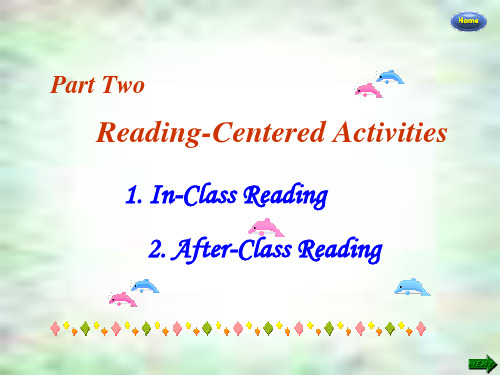
Part Two: In-Class Reading >>Global Reading
Sample 2
I usually avoid going to the hospital because to see a doctor is really tiring and time-consuming. So when I don’t feel well and it’s not a very serious case, what I usually do is to have a good rest. For example, when I have a cold, I will drink a lot of water and stay in bed. If it’s a serious health problem and I can’t recover by taking a good rest, I’ll go to the doctor and get some medicine. Just like most people, I hope the doctor will comfort me besides prescribing me the medicine.
“Yes”, “No” or “Maybe” in the space provided.
Yes No
Maybe
means it is true.
means it is false. means there is not enough information in the article to know whether it is true or
♣ It focuses on specific steps a patient can take to
新视野大学英语(第三版)读写教程Book2-Unit4-电子教案
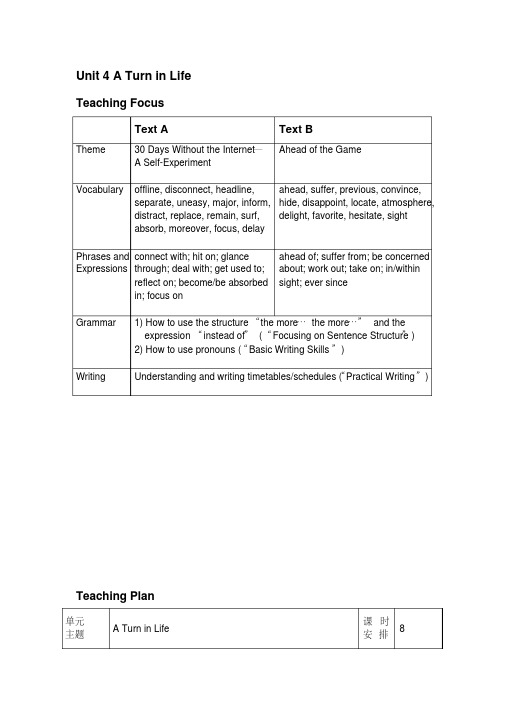
Unit 4 A Turn in LifeTeaching FocusText A Text BTheme30 Days Without the Internet—A Self-ExperimentAhead of the GameVocabulary offline, disconnect, headline,separate, uneasy, major, inform,distract, replace, remain, surf,absorb, moreover, focus, delay ahead, suffer, previous, convince, hide, disappoint, locate, atmosphere, delight, favorite, hesitate, sightPhrases and Expressions connect with; hit on; glancethrough; deal with; get used to;reflect on; become/be absorbedin; focus onahead of; suffer from; be concernedabout; work out; take on; in/withinsight; ever sinceGrammar 1) How to use the structure “the more…the more…”and theexpression “instead of”(“Focusing on Sentence Structure”)2) How to use pronouns (“Basic Writing Skills”)Writing Understanding and writing timetables/schedules (“Practical Writing”) Teaching Plan单元主题A Turn in Life课时安排8教育教学目标(学生) To learn the difficulty in fighting the addiction to the Internet and try to develop a good habit of using the Internet.To learn to be positive and helpful.To be familiar with the context meaning and the use of those vocabulary of the two texts listed in the above table.To be familiar with the collocation of those phrases and expressions listed in the above table.To be able to make sentences with deal with, focus on, every now and then, and be used to.To be able to rewrite sentences after models, using the structure “the more…, the more” or the expression of “instead of”.To learn some rules of using pronouns.To be able to understand and write a timetable/schedule.教学设计教学内容Section AText A: 30 Days Without the Internet—A Self-ExperimentSection BText B: Ahead of the GameSection CPractical Writing: Understanding and Writing Timetables/ Schedules教学活动安排建议Leading In and Exploring the TopicAsk the Ss to work in small groups to discuss the questionslisted in the exercise of Exploring the Topic on P60 of SB.Elicit answers from some students and give them helps wherenecessary.Then give the Ss 5 minutes to discuss the following threequestions:1)What do you usually use the Internet for?2)What will you do if you can’t access the Internet for morethan a week?3)What benefits can you think of to live without theInternet?Ask some representatives to share their groups’ opinion withthe class.Section A Reading ThroughShow the class the text structure on P127 of TB with PPT andallow them 5 minutes to look through the text with thestructure in mind.Give the Ss 10 minutes to read Para.2 to Para.8 again carefullyand try to find the answer to the following 4 questions:1) How did the author feel during the first week of theexperiment?2) What did the author do to distract himself?3) How did the author get used to the life without theInternet?4) What are the advantages of being disconnected from theInternet?Ask some students to share their answers with the class. Givethem some help where necessary.Highlight some difficult sentences and elicit explanationsfrom students and give helps where necessary.Basic Writing SkillsPrepare a PPT with sentences of the exercise on P69 to P70 ofSB.Ask some students to tell their answers to the class andexplain why.Check the understanding of the class by explaining theexamples given on P69 of SB.Section B Reading MoreAsk the students t o read and be familiar with the content of Text B.Pair up the Ss in class and allow them 10 minutes to discuss the following questions:1) What is the author’s friend suffering from? Why?2) What did the author’s friend like to do when they were incollege?3) What did the author’s friend receive one day?4) What words did his friend find on it?5) What did his friend do at last?6) What will you do if you are the friend?7) What will you do if you the author?Encourage some volunteers to share their ideas with the class. Section C Practical WritingGuide the students to finish the three exercises on P76 to P77 of SB according to the samples given.Ask each student to write a Chinese schedule for next week and then write an English one according to the Chinese one.课后学习设计作业(学生) Finish all the exercises in Unit Four.Read the passage in Reading Out on P64 of SB and recite it.List some other ways to fight Internet addiction besides the ones used in Text A.Write yourself an English schedule for next week.课后总结与反思(教师)。
大学英语精读第三版第二册Book2Unit4答案
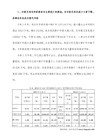
1) a drop of blood
2) a grain of wheat
3) a length of rope
4) a lump of sugar
5) a ball of string
6) a block of marble
7) a roll of toilet paper
8) a helping of pie
6) The dean of the philosophy department requested (that) the visiting scholar (should) give a lecture on Sartre.
1) bewildered
2) impressed
3) modest
4) bookkeeper/bookmark/book review/bookseller/bookshelf/booide/dockside/inside/outside
6) classroom/living room/reading room/waiting room/consulting room/dark room
4) The young man was seen to enter the building next to the bank.
5) When she was in Shanghai the actress was heard to say she had long thought of this city as her second home.
book2 unit4 词汇学案

高三英语一轮复习词汇学案Module 2 Unit 4【学习目标】认读课文中词汇,掌握词义和词性;正确拼写部分词汇:protect ,protection, decrease, die out, be in danger, distant, in relief, hunt, burst into laughter, importance, protect…from…, contain, affect, pay attention to, succeed, employ, harm, come into being, bite, according to, so that, appreciate,理解课文内容,能正确翻译课文中的句子,能熟练朗读课文。
能把课文中部分词汇、短语运用到写作中。
课前学案【课文单词分类】动词threaten 减少变少endanger 打猎猎取respond rub 包含容纳影响感动侵袭欣赏感激成功继任雇佣利用bite inspect形容词/副词远的远处的certain powerfulsecure unexpected fierce faithfully名词wildlife 保护habitat lossreserve zone fur mercy重要性mosquito insect income损害危害extinction dinosaur county incident dust disappearanceending短语灭亡逐渐消失和平地和睦地在危险中如释重负松了口气突然笑起来保护…不受…注意形成产生按照根据…所说以至于结果渴望做某事【话题词汇】Pollute(污染),Waste is scattering here and there.(到处撒满了废弃物),protect the environment(保护环境) ,send out smoke and poisonous gases into the air(散发出烟和有毒气体),cut down trees(砍伐树木),pour waste water into the rivers(把废水注入河流),It is a shame to throw rubbish around. (乱扔垃圾是可耻的),form good habits to protect the surroundings(养成良好的习惯来保护环境),take active measures to protect rare animals(采取积极措施保护稀有动物),take good care of our forests(关心我们的森林),plant more trees to improve the environment (多植来改善环境),The terrible pollution have done great harm to us as well as to the surroundings. (可怕的污染已经给我们自己还有我们的环境带来了很大的危害。
BOOk 4 Unit 4学案2

Unit 4 Body language 学案2A single flower does not make a spring.一花独放不是春百花齐放春满园1. Skim the passage and find out:1) What is the main idea of the text?The passage introduces some examples of cultural _________________ (身势语) when greeting people.2) What’s the main idea for each part?Part 1 (para. 1) (A) Different people have different physicalwaysto greet others. Learning about theircustoms can help avoid difficulties incommunication.Part 2 (para. 2 and 3) (B) You are sent to Capital InternationalAirport to meet some internationalstudents.Part 3 (para. 4 and 5) (C)Examples of learned or cultural “bodylanguage”.2.Careful reading:Paragraph 1:Time:___________________.People: _______________________________________________________________________. Place: __________________________________________________.What to do: ______________________________________________________.Paragraph 2:The teacher asks students to find out the two mistakes that the author noticed.The first misunderstandinge:Tony Garcia: He approached Julia, touched her_______ and ________ her on the ______Julia Smith: She ________appearing __________ and put up her hands as if._________The second misunderstanding:George Cook: He ________his hand______ to the Japanese.Akira Nagata: He_______ to George but his nose _______George’s hand .Paragraph 3&4:Paragraph 5:The teacher asks students read it and answer the following questions:(1). What’s the author’s attitude towards body language?(2).What’s the benef it of studying international customs?3.Read the passage again, and then decide the following statements are true (T) or false (F).1.Englishmen often stand close to others or touch strangers as soon as they meet.( )2.Most people around the world now greet each other by shaking hands .( )3.Japanese will bow to others as greeting. ( )4.People from Jordan will shake hands with a woman as she introduces herself to them. ( )5.Body language in some countries is good while some in others is bad. ( )4.Summary___1___language is ___2_______ from culture to ___3_____. Not all _____4___of a culture ___5_____in the ___6___ way.In general, __7_______ international customs can certainly help ____8____ difficulties in the cultural communication.学案2答案:1.1) body language 2)part 1---B part 2---C part3----C 2.careful reading:Paragraph 1:Time: yesterdayPeople: another student and I, this year’s international studentsPlace: the Capital International AirportWhat to do: We would take them first to their dormitories and then to the student canteen. Paragraph 2: 1. shoulder.2. kissed 3. cheek.4. stepped back 5. surprised 6. in defence7. reached8. out9. bowed10. touched11. movingParagraph 3&4: 答案见教学参考书p88.Paragraph 5: (1).He thinks these actions are not good or bad, but are simply ways in which cultures have developed.(2).It can help avoid difficulties in today’s world of cultural crossroads.3. 答案: True:2,3 False: 1,4,54.Summary答案:1.body 2.different 3.culture 4.members 4.behave5.behave6.same7.studying8.avoid。
Kid27sBoxBook4Unit2Book4剑桥少儿英语第四册2单元教案培训讲学
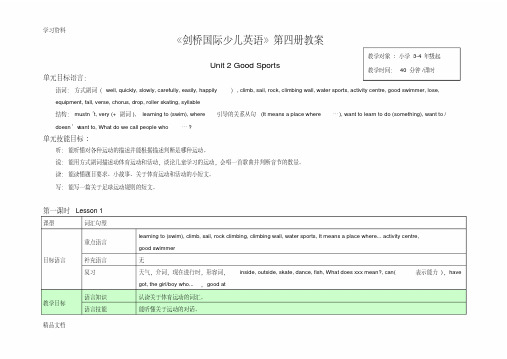
《剑桥国际少儿英语》第四册教案Unit 2 Good Sports单元目标语言:语词:方式副词(well, quickly, slowly, carefully, easily, happily), climb, sail, rock, climbing wall, water sports, activity centre, good swimmer, lose, equipment, fall, verse, chorus, drop, roller skating, syllable结构:mustn’t, very (+副词), learning to (swim), where引导的关系从句(It means a place where …), want to learn to do (something), want to / doesn’twant to, What do we call people who …?单元技能目标:听:能听懂对各种运动的描述并能根据描述判断是哪种运动。
说:能用方式副词描述动体育运动和活动,谈论儿童学习的运动,会唱一首歌曲并判断音节的数量。
读:能读懂题目要求、小故事、关于体育运动和活动的小短文。
写:能写一篇关于足球运动规则的短文。
第一课时Lesson 1课型词汇句型目标语言重点语言learning to (swim), climb, sail, rock climbing, climbing wall, water sports, It means a place where... activity centre,good swimmer补充语言无复习天气,介词,现在进行时,形容词,inside, outside, skate, dance, fish, What does xxx mean?, can(表示能力),have got, the girl/boy who...,good at教学目标语言知识认读关于体育运动的词汇。
综合英语教程4-02-Part 2
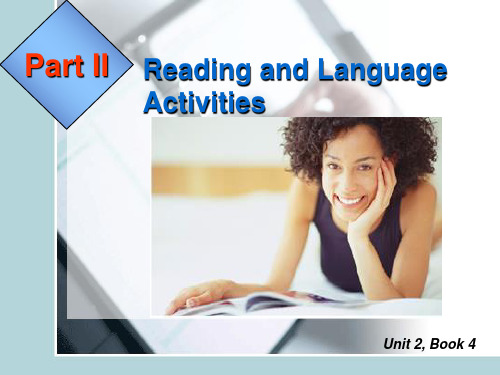
2. How did he invent this clever way of doing business? It all started by chance. One day, his car was broken on his way back to London. He accidentally discovered a pair of valuable armchairs of the 15th century when he visited a farmhouse nearby for help. Out of quick wit, he persuaded the old lady to sell them to him at a price less than a twentieth of their real value. Inspired by his windfall, he discovered an important source of supply: those old, impoverished rich farmhouses in the comparatively isolated countryside.
Part II Reading and Language
Activities
Unit 2, Book 4
Reading and Language Activities
Pre-reading Task Comprehension Work Language Work
Return to Menu
Unit 2, Book 4
Unit 2, Book 4
Reading for Gist
One day, Mr. Boggis drove to (1) _t_h_e_c_o_u_n_t_ry__. His car (2) _b_r_o_k_e_d_o_w__n_ near a farmhouse in the middle of the journey. In order to fix the car, he asked for (3) _a_j_u_g_o_f_w__a_te_r_ from the woman of the building. When he was waiting for her to fetch it, he was (4) __a_tt_r_a_c_te_d__ by two chairs, which in his eyes were worth at least (5) a__th_o_u_s_a_n_d_p_o_u_n_d_s_. So he make up his mind to buy them and (6) _b_a_r_g_a_in_e_d__ with the woman. In the end Mr. Boggis bought the chairs for something less than (4) _a_t_w_e_n_t_ie_t_h_ of their value. This lucky deal inspired Mr. Boggis. He (4) _c_a_m_e__u_p_w_i_t_h_ a good idea. If he could dress himself up like (9) __a_p_a_r_so_n__, going out for (10) _a_l_a_b_o_r_o_f_lo_v_e_ for making an inventory of antique feature for a local museum he would be able to search every English farmhouse around London for what he wanted.
10 Book2 Unit4 -高一英语构词法及词性分类背诵与默写学案(人教版2019)

最新人教版高中英语必修二第四单元构词法及词性分类背诵与默写学案(背诵版)骆海燕编Unit 4 History and traditions派生词大集合:单元词汇按构词法分类记忆。
注:黑体部分为课标词和短语。
备注:1、不收录人名和地名。
2、单元大部分词汇按构词法分类记忆,其余的另外归类记忆。
Unit 4 History and traditions(背诵版)动词、名词、形容词、副词、短语归类复习(注意一个单词多种词性!动词为先!)
【练练基本功·课前练习】写出下列动词的过去式,过去分词,现在分词,第三人称单数。
(需特别注意
Unit 4 History and traditions(默写版)动词、名词、形容词、副词、短语归类复习(注意一个单词多种词性!动词为先!)
【练练基本功·课前练习】写出下列动词的过去式,过去分词,现在分词,第三人称单数。
(需特别注意动词不规则变形!)
最新人教版高中英语必修二第四单元构词法及词性分类背诵与默写学案(背诵版)骆海燕编Unit 4 History and traditions派生词大集合:单元词汇按构词法分类记忆。
注:黑体部分为课标词和短语。
备注:1、不收录人名和地名。
2、单元大部分词汇按构词法分类记忆,其余的另外归类记忆。
新视野大学英语(BookII)教案
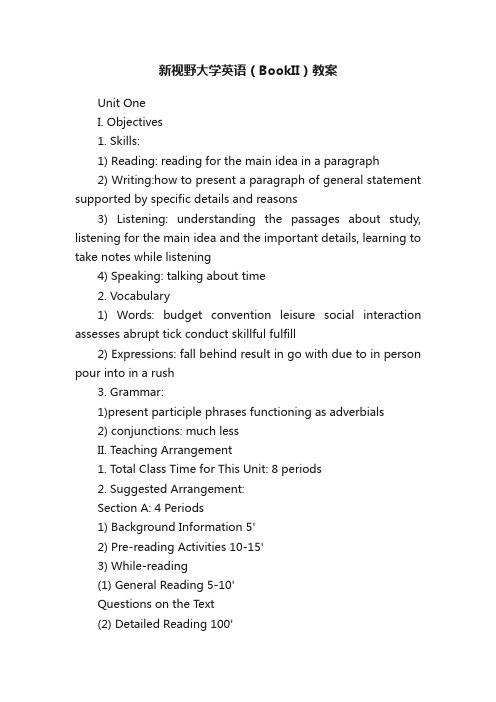
新视野大学英语(BookII)教案Unit OneI. Objectives1. Skills:1) Reading: reading for the main idea in a paragraph2) Writing:how to present a paragraph of general statement supported by specific details and reasons3) Listening: understanding the passages about study, listening for the main idea and the important details, learning to take notes while listening4) Speaking: talking about time2. Vocabulary1) Words: budget convention leisure social interaction assesses abrupt tick conduct skillful fulfill2) Expressions: fall behind result in go with due to in person pour into in a rush3. Grammar:1)present participle phrases functioning as adverbials2) conjunctions: much lessII. Teaching Arrangement1. Total Class Time for This Unit: 8 periods2. Suggested Arrangement:Section A: 4 Periods1) Background Information 5'2) Pre-reading Activities 10-15'3) While-reading(1) General Reading 5-10'Questions on the T ext(2) Detailed Reading 100'a. Words and Phrasesb. Language Pointsc. Sentence Patternsd. Main Idea of Each Part4) Post-reading(1) Useful Expressions 5'(2) Summary of the Text 10'(3) Structured Writing 15'(3) Exercises 45'(4) AssignmentsSection B: 2 Periods1) Reading Skills and Exercises 30'2) Detailed Study of the Text 50'3) Summary of the Text 20'14) Exercises 50'Listening and Speaking: 2 Periods1) Listening 75'2) Speaking 25'Section A Time-Conscious AmericansI. Background Information1. Time OrientationAmericans place considerable value on punctuality. Because they tend to organize their activities by means of schedules, they may seem harried, always running from one thing to the next and unable to relax and enjoy themselves. Since Americans are so time conscious, the pace of life may seem very hectic(紧张的). Being on time is regarded as very important, and in the U.S. most people make an effort to arrive on time. Not all Americans are punctual, but almost everyone is conscious of time. Differenttypes of activities have different conventions. One should arrive at the exact time specified for meals, and for appointments with professors, doctors, and other professionals. You can arrive any time between the hours specified for parties, receptions, and cocktail parties. Plan to arrive a few minutes before the specified time for public meetings, plays, concerts, movies, sports events, classes, church services, and weddings. If you are unable to keep an appointment, it is expected that you inform the other party that you will be late or unable to arrive.2. Hourglass:A glass container holding fine sand for measuring time, which is narrow in the middle like a figure8 so that the sand inside can run slowly from the top half to the bottom taking exactly one hour.沙漏:一种装上细沙以用来测量时间的玻璃容器,其颈部细小,形状象一个8字,使得上半部的沙子能缓慢地流到下半部中,其时间正好是一个小时。
译林版高中英语选必二Unit4 Reading II 教案
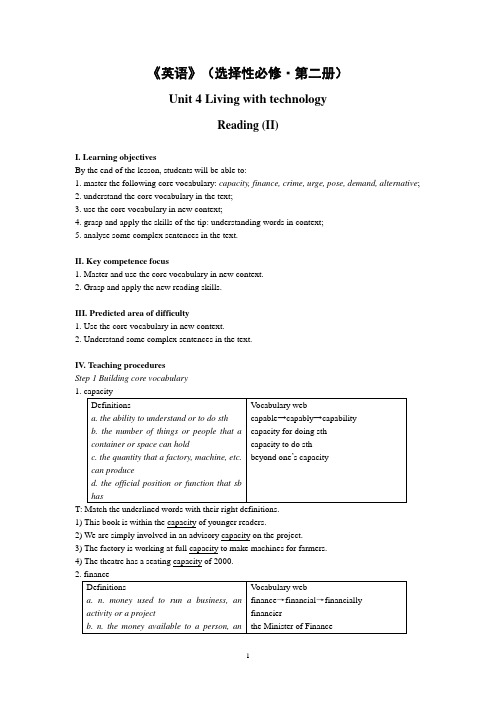
《英语》(选择性必修·第二册)Unit 4 Living with technologyReading (II)I. Learning objectivesBy the end of the lesson, students will be able to:1. master the following core vocabulary: capacity, finance, crime, urge, pose, demand, alternative;2. understand the core vocabulary in the text;3. use the core vocabulary in new context;4. grasp and apply the skills of the tip: understanding words in context;5. analyse some complex sentences in the text.II. Key competence focus1. Master and use the core vocabulary in new context.2. Grasp and apply the new reading skills.III. Predicted area of difficulty1. Use the core vocabulary in new context.2. Understand some complex sentences in the text.IV. Teaching proceduresStep 1 Building core vocabulary1) This book is within the capacity of younger readers.2) We are simply involved in an advisory capacity on the project.3) The factory is working at full capacity to make machines for farmers.4) The theatre has a seating capacity of 2000.1) It’s about time you sorted out your finances.2) Finance for education mainly comes from taxpayers.3) The band was financed by a famous financier.4) He has a diploma in banking and finance.T: Match the underlined words with their right definitions.1) Stores spend more and more on crime prevention every year.2) Mr Steele has committed no crime and poses no danger to the public.3) It would be a crime to travel all the way to Australia and not stop in Sydney.T: Match the underlined words with their right definitions.1) She urged him to stay.2) The situation is dangerous and the UN is urging caution.3) She urged her horse to jump the fence but failed.4) I had a sudden urge to hit him.1) He adopted a relaxed pose for the camera.2) Winter poses particular difficulties for the elderly.3) The artist asked her to pose for him to draw a pretty picture.4) The prisoner posed as a prison officer in order to escape.T: Match the underlined words with their right definitions.1) The project has demanded considerable investment of time and effort.2) There’s an increased demand for organic produce these days.demands.3) This firm attempts to meet its customers’1) We had no alternative but to fire Tom.2) There was no car to rent, so we found an alternative means of transport.【设计意图:此节关于核心词汇学习。
【公开课】Unit+4+Reading+for+Writing+说课教案人教版(2019)必修第二册
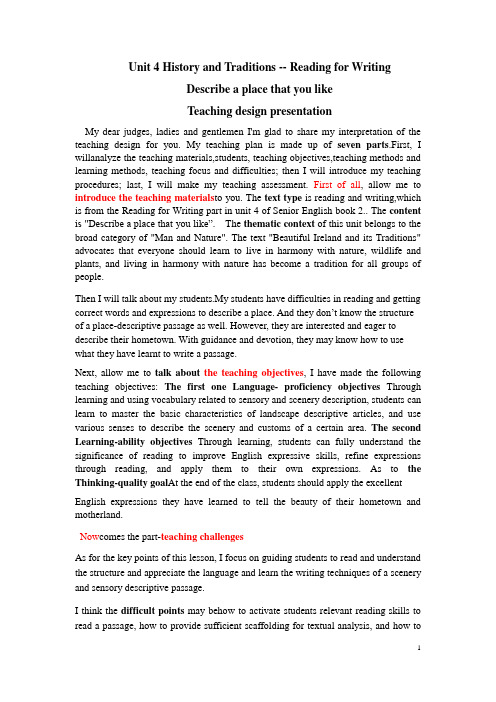
z Unit 4 History and Traditions -- Reading for WritingDescribe a place that you likeTeaching design presentationMy dear judges, ladies and gentlemen I'm glad to share my interpretation of the teaching design for you. My teaching plan is made up of seven parts .First, I willanalyze the teaching materials,students, teaching objectives,teaching methods and learning methods, teaching focus and difficulties; then I will introduce my teaching procedures; last, I will make my teaching assessment. First of all , allow me to introduce the teaching materials to you. The text type is reading and writing,which is from the Reading for Writing part in unit 4 of Senior English book 2.. The content is "Describe a place that you like”. The thematic context of this unit belongs to the broad category of "Man and Nature". The text "Beautiful Ireland and its Traditions" advocates that everyone should learn to live in harmony with nature, wildlife and plants, and living in harmony with nature has become a tradition for all groups of people.Then I will talk about my students.My students have difficulties in reading and getting correct words and expressions to describe a place. And they don’t know the structure of a place-descriptive passage as well. However, they are interested and eager to describe their hometown. With guidance and devotion, they may know how to use what they have learnt to write a passage.Next, allow me to talk about the teaching objectives , I have made the following teaching objectives: The first one Language- proficiency objectives Through learning and using vocabulary related to sensory and scenery description, students can learn to master the basic characteristics of landscape descriptive articles, and use various senses to describe the scenery and customs of a certain area. The second Learning-ability objectives Through learning, students can fully understand the significance of reading to improve English expressive skills, refine expressions through reading, and apply them to their own expressions. As to the Thinking-quality goal At the end of the class, students should apply the excellent English expressions they have learned to tell the beauty of their hometown and motherland.Now comes the part-teaching challengesAs for the key points of this lesson, I focus on guiding students to read and understand the structure and appreciate the language and learn the writing techniques of a scenery and sensory descriptive passage.I think the difficult points may behow to activate students relevant reading skills to read a passage, how to provide sufficient scaffolding for textual analysis, and how toz inspire the ability to use the language.Then Part 4, Teaching techniques and Learning MethodsIn order to clarify the important and difficult points of the teaching materials and enable students to achieve the teaching goals set in this class, I will talk about teaching methods and learning methods.The whole lesson consists of six tasks, each corresponding to a specific activity requirement, so I mainly employ the Task-based teaching method and communicative method. The transition from "learning" to "using" requires the guidance of the following learning methods.1.Analysis and induction: through detailed careful reading, to sort out the clues of the article and what the author sees, hears and feels; 2.Cooperative learning method: The group divides the work to have discussion as a brainstorming for writing.Part 5:Teaching procedures Now I will introduce my teaching procedures to you. In Lead in part(2minis) I present several pictures of the Irish landscape, as well as famous singers, so that students can perceive the natural beauty of Ireland and arouse their interest in learning. In pre-reading(1minis)we first analyze the title to predict the main idea of the passage. In while –reading part, we first skim (3 minis), the passage and underline the introductory sentence and the ending sentence to learn the structure; then scan for details and writing skills(8 minutes): do careful reading to find out what makes the Irish countryside fascinating, the senses used in each location, and the expressions found in the text that can be used for writing. In post-reading part, we do three summaries: How to write a descriptive passage?(2min) Summarize the sensory details and rhetorical devices of the main body of the descriptive essay. Next we cometo writing part (15mins): do group discussion to find the topic to write about and useguided questions to write. Then do the assessments(5mins):ask students to do self- correction and peer assessment.( The following is board design /the homework: reciting useful language points and sample writing)The last part: Teaching reflection:My weak points: Given more time, I should use more meaningful activities to make students know how to write polished sentences. Ask students to present their worksand give reviews and feedback.Then, what is my innovative point? Combining the changing scenery and sensory experience of the descriptive passage, then writing closely following lines of the article. Combined with real life experience, then applying the description of Irish scenery to the description of their hometown, so that students can learn and use it immediately, learn advanced sentence patterns with fun, and truly feel the beauty of nature, and establish the awareness of harmonious coexistence between man and nature.Conclusion: In general, this lesson follows the concept of "teacher-led, student-oriented", gives full play to students' autonomy, allows students to actively participate in exploration and learning, mobilizes their thinking activity, improves their cognitive level in a positive and pleasant and interesting classroom atmosphere, and finally achieves the expected teaching goals. My presentation is over. Thank you all, and I am looking forward to your corrections.z。
选择性必修2 Unit4 Reading and thinking 教学设计

A teaching plan of Unit4 Journey Across A Vast Land(1st period Reading And Thinking)Teaching material:optional compulsory Book2, seniorTask: Unit4 Journey Across A Vast Land Section 1Class: class 5, senior 2Time: 2021.12.08Designer: Mao JilinLearning objectives1. Learn the new words and phrases related to the rail journey.2.Find the two lines of the text and list the major destinations along the route with their geography landscape culture climate.3.Identify discourse markers and state their functions in the text.4.Retell the travelling experience in order of time and space.Focal and difficult points:1.Focal pointsFind the two lines of the text and gain a knowledge of Canada’s geography and culture.And learn to identify discourse markers and state their functions in the text.2.Retell the travelling experience in order of time and space,relate the journey to their own travelling experience and reflect on the meaning of a long journey.Blackboard design1.Travelling route:Vancouver lake Louise JasperWinnipeg2.Discourse markers:Function Examples1. Adding: also besides additionally moreover too2. Reason: because since as for3. Emphasis: in fact indeed above all4.Time :when as soon as untilparison:similarly likewise6.Contrast:while by contrast on the other hand on the contrary7.Result:therefore as a result consequently accordingly8.Order of events:first second next later9.Giving examples:for example such as10.Conclusion:to conclude in a word all in all。
新视野大学英语第三版电子教案Book2Unit4
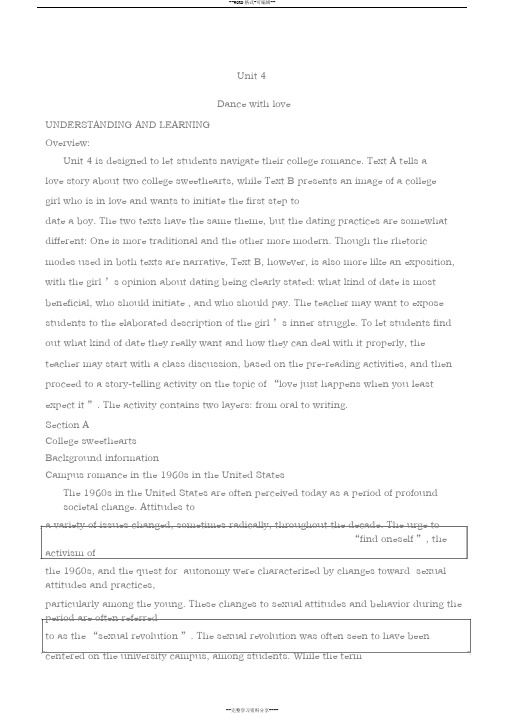
Unit 4Dance with loveUNDERSTANDING AND LEARNINGOverview:Unit 4 is designed to let students navigate their college romance. Text A tells alove story about two college sweethearts, while Text B presents an image of a collegegirl who is in love and wants to initiate the first step todate a boy. The two texts have the same theme, but the dating practices are somewhat different: One is more traditional and the other more modern. Though the rhetoric modes used in both texts are narrative, Text B, however, is also more like an exposition, with the girl ’s opinion about dating being clearly stated: what kind of date is most beneficial, who should initiate , and who should pay. The teacher may want to expose students to the elaborated description of the girl ’s inner struggle. To let students find out what kind of date they really want and how they can deal with it properly, the teacher may start with a class discussion, based on the pre-reading activities, and then proceed to a story-telling activity on the topic of “love just happens when you least expect it ”. The activity contains two layers: from oral to writing.Section ACollege sweetheartsBackground informationCampus romance in the 1960s in the United StatesThe 1960s in the United States are often perceived today as a period of profound societal change. Attitudes toa variety of issues changed, sometimes radically, throughout the decade. The urge to“find oneself ”, the activism ofthe 1960s, and the quest for autonomy were characterized by changes toward sexual attitudes and practices,particularly among the young. These changes to sexual attitudes and behavior during the period are often referredto as the “sexual revolution ”. The sexual revolution was often seen to have been centered on the university campus, among students. While the term“revolution ”implies radical and widespread change, this was not necessarily in the case. Even in the “liberal ”1960s, conservative and traditional views were widely held. The love story in Text A coincides with what happened in that particular historical period of time in the United States. From the storystudents can see the main characters, college sweethearts back then, were actually following a more traditionalpattern of dating, romantic but conservative, a clear stream on campus in the 1960s.Detailed study of the text1.I smile at my two lovely daughters and they seem so much more mature than we,their parents, when we were college sweethearts. (Para. 1)Meaning beyond words: Married to her college sweethearts, the author now is happy with her family and two grown daughters.2. Linda, who ’s 21, had a boyfriend in her freshman year she thought she would marry, but they are not together anymore. Melissa, who ’s 19, hasn’thad a steady boyfriend yet. My daughters wonder when they meet “The One”, their great love. (Para. 1)2.Meaning beyond words: Her two daughters are at the age of just dating, but they seemto be very mature wondering when they will meet their true love.13. They think their father and I had a classic fairy-tale romance heading for marriage from the outset. (Para. 1)Meaning beyond words: Her daughters consider their parents ’marriage a typical conventional romance because they think it aimed at marriage from the very beginning. ★ classic: a.(usu. before noun) admired by many people, and having a value that has continued for a long time 经典的The Coca-Cola bottle is one of the classic designs of the last century. 可口可乐瓶子上是上个世纪的经典设计之一。
全新版大学英语综合教程第二册第四单元课后练习答案unit 4 book 2
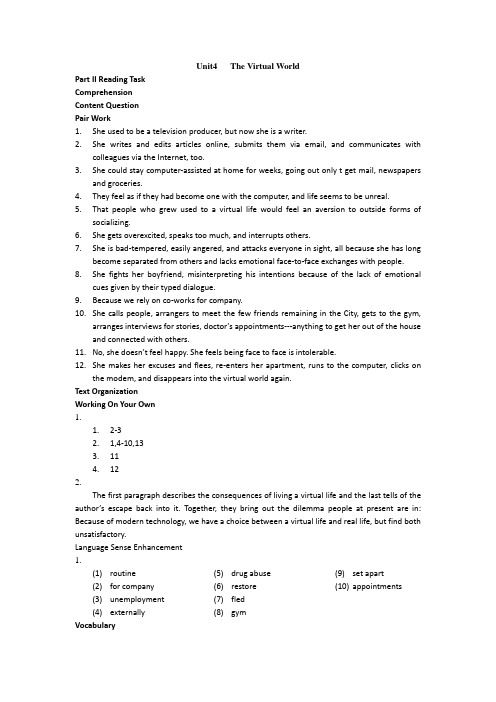
Unit4 The Virtual WorldPart II Reading TaskComprehensionContent QuestionPair Work1.She used to be a television producer, but now she is a writer.2.She writes and edits articles online, submits them via email, and communicates withcolleagues via the Internet, too.3.She could stay computer-assisted at home for weeks, going out only t get mail, newspapersand groceries.4.They feel as if they had become one with the computer, and life seems to be unreal.5.That people who grew used to a virtual life would feel an aversion to outside forms ofsocializing.6.She gets overexcited, speaks too much, and interrupts others.7.She is bad-tempered, easily angered, and attacks everyone in sight, all because she has longbecome separated from others and lacks emotional face-to-face exchanges with people.8.She fights her boyfriend, misinterpreting his intentions because of the lack of emotionalcues given by their typed dialogue.9.Because we rely on co-works for company.10.She calls people, arrangers to meet the few friends remaining in the City, gets to the gym,arranges interviews for stories, doctor’s appointments---anything to get her out of the house and connected with others.11.No, she doesn’t feel happy. She feels being face to face is intolerable.12.She makes her excuses and flees, re-enters her apartment, runs to the computer, clicks onthe modem, and disappears into the virtual world again.Text OrganizationWorking On Your Own1.1.2-32.1,4-10,133.114.122.The first paragraph describes the consequences of living a virtual life and the last tells of the author’s escape back into it. Together, they bring out the dilemma people at present are in: Because of modern technology, we have a choice between a virtual life and real life, but find both unsatisfactory.Language Sense Enhancement1.(1)routine(2)for company(3)unemployment(4)externally (5)drug abuse(6)restore(7)fled(8)gym(9)set apart(10)appointmentsVocabularyI 1.1)conversely2)but then3)symptom4)spitting 5)abusing6)tone7)took; in8)editing9)have arranged10)in sight11)stretched12)data2.1)smoking cigarettes jars on me.2)find themselves getting sucked in.3)has arranged for a technician from the computer store to check and repair it.4)fled their country to avoid military service/fled to other countries to avoid militaryservice.5)restore people’s confidence in it.3.1)the virtual; on line; via2)nightmare; routine; any appointment; arrange for3)cue; remarks; his tuneI.Collocation1.We came here all the way on foot.2.Private cars are not allowed on campus.3.They are on vacation in Florida.4.Mary has been talking to her friend on the phone for an hour.5.Don’t worry, Lucy is always on time.6.Industrial demand on fuel is on the rise.age1.hard2.difficult3.impossible4.tough5.hard6.easyprehensive Exercises IV.cloze1.(1)Internet(2)click(3)virtual(4)routines(5)arrange(6)nightmare (7)annoying(8)connection(9)crawls(10)take in(11)spit(12)data(13)sucked into(14)At times(15)flee(16)on line2.(1)companion(2)deliver(3)access(4)enables(5)customers(6)delights(7)provides (8)small(9)remote(10)informationV.Translation1.1)Research shows that laughter can bring a lot of health benefits.2) A show Internet connection speed is really annoying.3)As the law stands, helping someone commit suicide is a crime.4)In her report, Mary tries to interpret the data from a completely different angle.5)Sue is a girl of great talent. Her amazing memory sets her apart from her classmates. 2.Perhaps you envy me for being able to work from home on the computer. I agree that the Internet has made my job a lot easier. I can write, submit and edit articles via email, chat with my colleagues on line and discuss work with my boss. With a click of the mouse, I can get all the data I need and keep up with the latest news. But then, communicating through the Net can be frustrating at times. The system may crash. Worse still, without the emotional cues of face-to-face communication, the typed words sometimes seem difficult to interpret.。
高中英语必修二 课文详解Book 2-unit 4 (2)
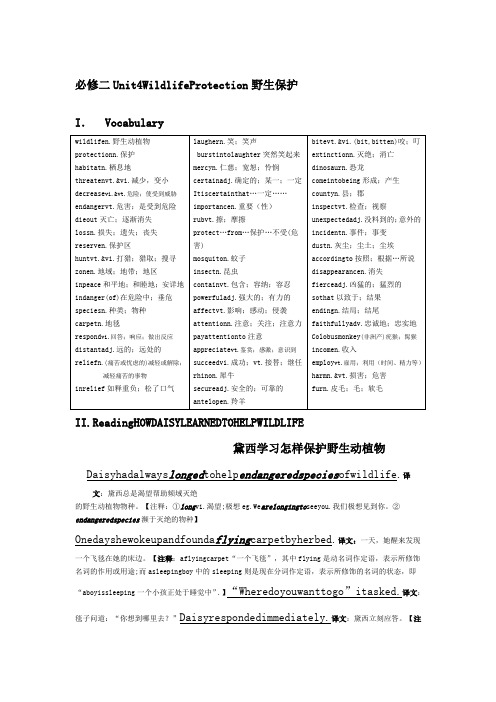
必修二Unit4WildlifeProtection野生保护I.VocabularyII.ReadingHOWDAISYLEARNEDTOHELPWILDLIFE黛西学习怎样保护野生动植物Daisyhadalways longed tohelp endangeredspecies ofwildlife.译文:黛西总是渴望帮助频域灭绝的野生动植物物种。
【注释:①long vi.渴望;极想eg.We arelongingto seeyou.我们极想见到你。
②endangeredspecies濒于灭绝的物种】Onedayshewokeupandfounda flying carpetbyherbed.译文:一天,她醒来发现一个飞毯在她的床边。
【注释:aflyingcarpet“一个飞毯”,其中flying是动名词作定语,表示所修饰名词的作用或用途;而asleepingboy中的sleeping则是现在分词作定语,表示所修饰的名词的状态,即“aboyissleeping一个小孩正处于睡觉中”.】“Wheredoyouwanttogo”itasked.译文:毯子问道:“你想到哪里去?”Daisyrespondedimmediately.译文:黛西立刻应答。
【注释:⑴vt.&vi.回答;回报;响应eg.1)Iofferedhimadrinkbuthedidnotrespond.我请他喝酒,但他未作回答。
2)Theyrespondedmyjokebylaughing.他们对我的笑话报以大笑。
⑵vi.有反应;有效果;有影响eg.Theirenvoyshowednosignofrespondingtoourproposals.他们的代表对我方的提议毫无回应的迹象。
】“I’dlike toseesomeendangeredwildlife,”shesaid.译文:她说:“我极想看看某种频域灭绝的野生动植物物种。
新视野大学英语book2 Unit 4 自主学习
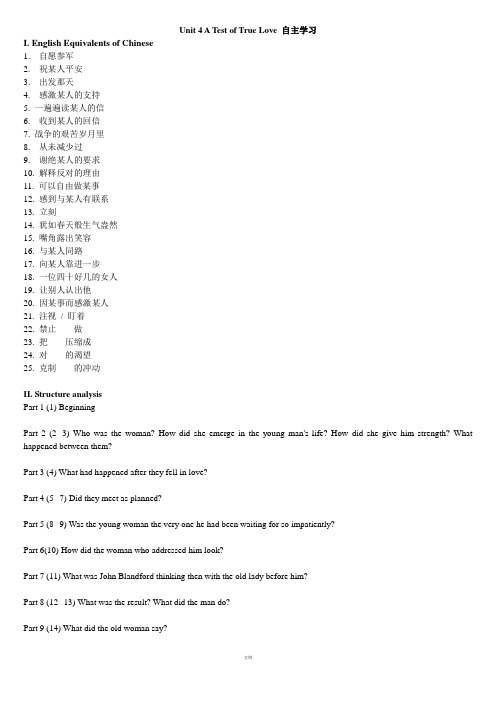
Unit 4 A Test of True Love 自主学习I. English Equivalents of Chinese1. 自愿参军2. 祝某人平安3. 出发那天4. 感激某人的支持5. 一遍遍读某人的信6. 收到某人的回信7. 战争的艰苦岁月里8. 从未减少过9. 谢绝某人的要求10. 解释反对的理由11. 可以自由做某事12. 感到与某人有联系13. 立刻14. 犹如春天般生气盎然15. 嘴角露出笑容16. 与某人同路17. 向某人靠进一步18. 一位四十好几的女人19. 让别人认出他20. 因某事而感激某人21. 注视/ 盯着22. 禁止······做······23. 把······压缩成······24. 对······的渴望25. 克制······的冲动II. Structure analysisPart 1 (1) BeginningPart 2 (2--3) Who was the woman? How did she emerge in the young man's life? How did she give him strength? What happened between them?Part 3 (4) What had happened after they fell in love?Part 4 (5--7) Did they meet as planned?Part 5 (8--9) Was the young woman the very one he had been waiting for so impatiently?Part 6(10) How did the woman who addressed him look?Part 7 (11) What was John Blandford thinking then with the old lady before him?Part 8 (12--13) What was the result? What did the man do?Part 9 (14) What did the old woman say?III. Question answering1.Why was John Blandford staying in Grand Central Station in New York?2.How did John get connected with the woman?3.How was John’s first response to the woman different from that of his friends?4.What had the woman, Hollis Meynell, done in the past thirteen months?5.How did he feel as long as he received her letters?6. When he asked her for a photo, what did she do?7. Did Hollis Meynell come to the station as they had arranged?8. Why did Hollis Meynell want to test John Blandford?IV. SummaryJohn Blandford __________ for military service 13 month ago. Soon he received a book from Hollis Meynell, a woman who sent everyone in the military service a book, strength and her support for their cause. He wrote back, and thus went into _________ with her. For thirteen months, she wrote and gave him courage to . After a short time, he believed that they loved each other and that had brought them together. But , she his request of her photo. Now the soldier was back in New York, waiting to meet her in person at the _________ desk in Grand Central Station, and a young girl in good figure was coming in his direction, but a red rose as they planned. When he invited the fat woman with the rose to dinner, it turned out to be a of Hollis Meynell, and he passed it.V. Definition of LoveLove =listen, ______________, ________________, ______________VI. Language Points:1.他每周必定写信。
- 1、下载文档前请自行甄别文档内容的完整性,平台不提供额外的编辑、内容补充、找答案等附加服务。
- 2、"仅部分预览"的文档,不可在线预览部分如存在完整性等问题,可反馈申请退款(可完整预览的文档不适用该条件!)。
- 3、如文档侵犯您的权益,请联系客服反馈,我们会尽快为您处理(人工客服工作时间:9:00-18:30)。
A. a storyB. a piece of newsC. an advertisementD. a travel journal
Step2.Answer questions
<课本>P35 part1&2
Step 3.Choose the best answer
C. greatly B. a lot
A. a bit D. lightly
3.Which of the following statement is true according to the text?
A.Li Daiyu and Liu Qian went toCanadaon a train because the train is more comfortable.
1.Which of the following is described as the most beautiful city inCanada?
A. Vancouver B.Calgary
C. Toronto D.Montreal
2. What does the word“slightly”in the text mean?(the last line on page 34)
B.Thunder Bayis a port city on the coast ofAtlantic Ocean
C.looking out of the windows , the girls saw the goats, beaver and cowboys.
D.Liu Daiyu and Liu Qian went toCanadato see their relatives on the Atlantic coast.
Climate:__________________________________________________________________
Resource______________________________________
2.Fill in the blanks.
Canada is a __________(多文化的) country. It covers an area of_____ million square kilometers and is __________________ (第二大) country in the world. ______ is its capital. Canadians speak _________________. ________ is the national flower and _________ is the national animal.
课题:Book3 unit5Canada—“The True North”(2)
主备人:施兰花
Perio2Carefulreading
【学习目标】
1.Learn how to read a traveling report and use maps.
2.Learn to express directions and positions.
Size: the_______largest country in the world;
has an area of_________square kilometers ;
Population: a population of_________million.
Languages:Official languages:________and__________
三、【课堂检测】
Find out the traveling route of the two girls on the map
四、【学后反思】
五、【课后巩固练习】(完美课堂P67Summary)
Li Daiyu and her cousin were__ __ ___ to Canada.They decided to __ ___ China to Vancouver and to ___ __ ___from west to east.Danny Lin was going to take them to catch __ ___ ____,the ________ train.Canada is the ____ _____ country in the world..As they go _____.they will see ______, lakes, ____ and ________as well as cities.It is _____ kilometers from ____ to ____.Vancouver is the _____ part of Canada.Its population is _______ rapidly because many people want to live there.
【学习过程】
一、【课前自主学习】
Listen to the tape and read the passage after the tape.
二、【课堂探究、合作、展示】
Step1.Revision
Fill in the blanks.
1.Position:_________________________________________
